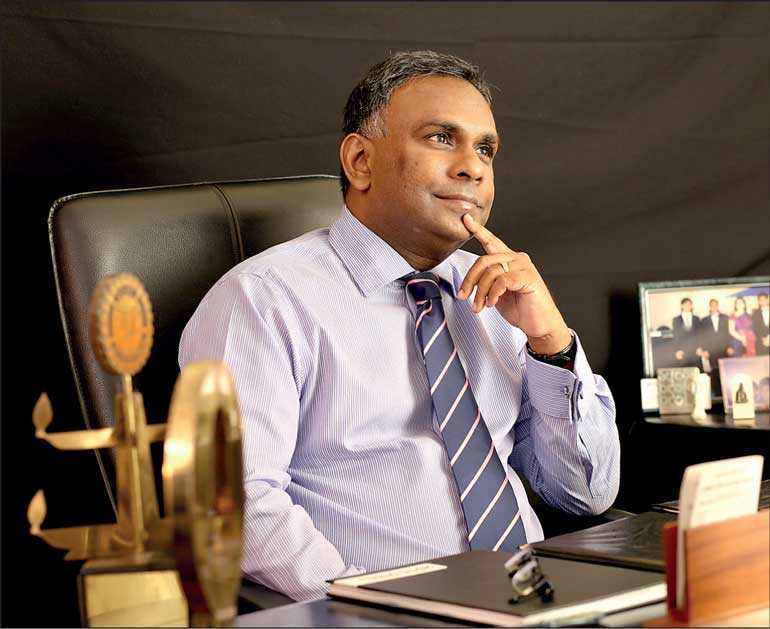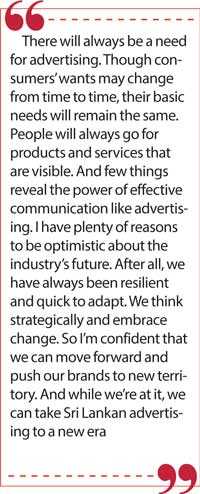Thursday Feb 19, 2026
Thursday Feb 19, 2026
Monday, 30 November 2020 00:00 - - {{hitsCtrl.values.hits}}

Holmes Pollard & Stott Chairman/MD Pradeep Amirthanayagam
It is now 30 years since the establishment of Holmes Pollard & Stott. This advertising agency quickly made an impact by injecting a new energy into the industry. Over the years, it has launched, nurtured and repositioned a number of breakthrough brands. Along the way, it has won many prestigious accolades. Today it has a strong portfolio of clients, including listed blue chip companies. The agency’s success has been driven by Pradeep Amirthanayagam. A well-known media personality, he was instrumental in setting it up and helmed operations as the CEO from the very inception. Today, he is the Chairman and Managing Director. In the interview below, he talks about the agency’s achievements, strategic insights and future direction
Q: Holmes Pollard & Stott celebrated its 30th anniversary recently. It has been a long journey, and your own life has been inextricably linked to it. Looking back, are you proud of what has been achieved so far?
Yes, I’m certainly proud of what we have done. Thirty years ago, I was hired as the local CEO of an advertising network that spanned the Asia-Pacific region. It was founded by three friends from Sydney – Jeremy Holmes, Martin Pollard and Norman Stott. Since Jeremy was born in Sri Lanka, he was keen on setting up here, and that’s how I entered the scene. I recruited a team drawn from the best, and before long we were going fast and strong. Today, I’m both proud and humbled by the fact that of the seven agencies established under that network, only we succeeded! This tells a lot about our drive and passion. Around 15 years ago, I bought over the agency, and today I’m the sole custodian.
Q: What are the main reasons for the agency’s success over the years?
Our achievements are based on many things. However, I must particularly emphasise our focus on Sinhala. From the very start, we believed in the power of the Sinhala idiom, and were among the first to conceptualise and present in that language. This enabled us to effectively communicate the client’s brief to a mass audience. Even today, everything from our hiring policy to creative strategy is largely vernacular-based.
Q: Holmes Pollard & Stott has built and grown many well-known brands. Can you list some of the pioneering work undertaken over the past three decades?
Our agency created the first animated TV ad, which was part of an award-winning campaign. We were also the first to pitch in Sinhala. In addition, we helped launch several brands that went on to make it big. These included Newdale Yoghurt, Maliban Kiri Milk Powder, Union Bank and Maruti.
Popularising these brands was not easy. However, we succeeded by transforming the local consumer’s mindset and attitudes. In the case of Newdale Yoghurt, for example, we had to create a willingness to try out stirred yoghurt. This was tough because people were only familiar with set yoghurt at the time. But we succeeded in changing consumer preferences to create a market for stirred yoghurt.
We faced a similar challenge in launching Maliban Kiri. The local market was then dominated by international dairy brands like Anchor. But before long, we managed to change consumer perceptions to favour this local newcomer. In fact, the campaign was so successful that this milk powder brand finally achieved higher business volumes than Maliban’s traditionally popular biscuits. 
Our work for Maruti had a similar outcome. At a time when Indian automobile manufacturers didn’t have a reputation here, we managed to popularise their cars. Union Bank was another success story. The basic proposition was simple – ‘Let’s get together.’ Our campaign revolved around creating greater intimacy and a lasting bond between the bank and the customer. The customer was made to feel that he or she was more than a mere account number.
We also helped launch the pioneering satellite TV service CBNsat. It is today known as Dialog TV. In addition, we relaunched the Mobitel brand with an image that still defines them.
Q: You have had wide exposure in the fields of media, advertising and marketing. So you must have gained some valuable insights into what makes brands tick. What is the advice you would give your clients to make an impact in the market?
I would tell them to constantly take stock of their brand. Like any celebrity in the public eye, a brand needs renewal, relevance and focus. From time to time, a facelift is necessary. Otherwise it will undergo a steady decline due to competition, new trends and market dynamics. I would tell them to never let fatigue set in. I often share my insights with clients to ensure that they keep ahead of the curve. My philosophy is that we can only be as good as our clients’ success.
Q: What is your strategy to stay ahead of the game in an industry that’s constantly evolving? What differentiates your agency from others?
First of all, we ensure that we have a deep and intimate knowledge of what we handle. This includes our clients, their products and services, their competition and market trends in general. We need to absorb these into our system. This is something I always emphasise to our client service and creative teams. They certainly do their research well. We often link our communications to local culture based on consumer insights. We are thus able to take a multi-pronged approach that pays off in the end.
Q: Can you also tell us something about your agency team and the work culture?
We have a diverse team, and constantly infuse new blood. We take in young people and mentor them while giving them the creative space to express themselves. We help them identify their inherent abilities. In fact, we have been a springboard for many who have gone on to excel in their respective fields both locally and overseas.
I also encourage the free flow of ideas between the various teams – client service, creative, media and production. I believe that rigidly compartmentalising these tasks will stifle their true potential and what we are capable of achieving together. We act as one, and as a result have a synergy that translates to producing good work.
We also send our people overseas for training. We want to expose them to what’s happening in the world of advertising and keep them up to date. I also have an open-door policy that welcomes former team members who want to rejoin. Interestingly, we have at least five employees who have been with us continuously for 25 years.
Q: Looking ahead, what is the future direction of the agency? What role will the latest technological trends play in the next growth phase?
We have prepared ourselves for the future. We believe in evolving with marketing and technological advances. Sometime ago we developed a digital arm, and today they deal with a sizeable number of clients. It is a growing business and we see enormous potential for the future. We will leverage digital technologies to offer strategic advantages to our clients.
We see innovation as key to our future outlook. We will continue to invest in young people who are dynamic and can adapt quickly. Today we see some exciting trends like precision marketing and the 720 degree view of consumers. These can revolutionise the communications experience. We will also focus on reaching new and younger audiences, including millennials and Gen Z. By envisioning the future, we can seize the opportunities that come our way.
Q: The advertising industry is currently facing rough times, largely due to the disruption and uncertainty caused by the COVID pandemic. How do you think these challenges can be overcome?
Throughout history, there have been all kinds of disruptions due to war and disease. The COVID pandemic is the latest, and though it’s tough to overcome, life must go on. It will take a heavy toll but will finally fade away. I know that many in the industry are struggling. However, we must somehow learn to adapt to the situation. Our agency, for example, quickly put in place a system for remote working, and we often interact through Zoom meetings.
It is now more important than ever to stand united. The industry must work together to further our common interests. We must not engage in undercutting and other unethical activities. If we compromise on our work and professionalism, the entire industry will suffer over the long term.
Q: What is your outlook for the future, for both your agency and the industry in general?
There will always be a need for advertising. Though consumers’ wants may change from time to time, their basic needs will remain the same. People will always go for products and services that are visible. And few things reveal the power of effective communication like advertising.
I have plenty of reasons to be optimistic about the industry’s future. After all, we have always been resilient and quick to adapt. We think strategically and embrace change. So I’m confident that we can move forward and push our brands to new territory. And while we’re at it, we can take Sri Lankan advertising to a new era.